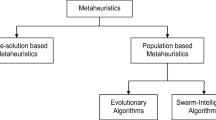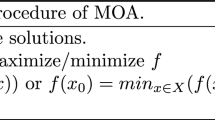Abstract
A novel memetic computing optimization algorithms, i.e. an adaptive variable space differential evolution algorithm (AVSDE), is proposed to improve the global optimization performance. AVSDE guides most individuals search in adaptive variable space (AVS) and employs adaptive mutation and adaptive control parameter. In AVSDE, AVS is determined by population global distribution information, and DE’s operators depend on the local information of the distance and direction. The performance of AVSDE is improved by integrating the global information with the local information. In addition, different mutation strategies are selected according to the evolution stage and random probability to balance AVSDE’s exploration and exploitation abilities, and adaptive control parameter is used to further enhance the performance of AVSDE. 19 scalable benchmark functions are employed to demonstrate the performance of AVSDE. Comparing with two well-tuned conventional DE and several state\(-\)of-the\(-\)art parameter adaptive DE variants, the whole performance of AVSDE is the best. Finally, two experiments are conducted to analyze the effect of the key parameters on AVSDE’s performance, and the optimal parameters are obtained.

Similar content being viewed by others
References
Neri F, Cotta C, Moscato P (2012) Handbook of memetic algorithms. Studies in computational intelligence, vol 379. Springer, Berlin, pp 43–54
Ong YS, Lim MH, Chen X (2010) Memetic computation—past, present and future. In: Proceedings of the. IEEE computational intelligence magazine, vol 5, pp 24–31
Neri F, Iacca G, Mininno E (2011) Disturbed exploitation compact differential evolution for limited memory optimization problems. Inf Sci 181(12):2469–2487
Neri F, Cotta C (2012) Memetic algorithms and memetic computing optimization: a literature review. Swarm Evol Comput 2:1–14
Tang J, Lim MH, Ong YS (2007) Diversity-adaptive parallel memetic algorithm for solving large scale combinatorial optimization problems. Soft Comput Fusion Found Methodol Appl 11(9):873–888
Nguyen QC, Ong YS, Lim MH (2009) A probabilistic memetic framework. IEEE Trans Evol Comput 13(3):604–623
Iacca G, Neri F, Mininno E, Ong YS, Lim MH (2012) Ockham’s razor in memetic computing: three stage optimal memetic exploration. Inf Sci 188:17–43
Moscato P, Norman M (1989) A competitive and cooperative approach to complex combinatorial search. California Institute of Technology, Pasadena, California, USA, Technical Report 790
Hart WE, Krasnogor N, Smith JE (2005) Memetic evolutionary algorithms. Recent advances in memetic algorithms, vol 166. Springer, Berlin, pp 3–27
Neri F, Mininno E (2010) Memetic compact differential evolution for Cartesian robot control. IEEE Comput Intell M 5(2):54–65
Larrañaga P, Lozano JA (2002) Estimation of distribution algorithms: a new tool for evolutionary computation, vol 2. Kluwer, Dordrecht, pp 99–124
Harik GR, Lobo FG, Goldberg DE (1999) The compact genetic algorithm. IEEE Trans Evol Comput 3(4):287–297
Harik G (1999) Linkage learning via probabilistic modeling in the ECGA. University of Illinois at Urbana-Champaign, Urbana, Technical Report 99010
Mininno E, Neri F, Cupertino F, Naso D (2011) Compact differential evolution. IEEE Trans Evol Comput 15(1):32–54
Mininno E, Cupertino F, Naso D (2008) Real-valued compact genetic algorithms for embedded microcontroller optimization. IEEE Trans Evol Comput 12(2):203–219
Storn R, Price K (1995) Differential evolution-a simple and efficient adaptive scheme for global optimization over continuous spaces. Technical Report TR-95-012, Berkeley
Price K, Storn R, Lampinen J (2005) Differential evolution—practical approach to global optimization. Springer, Berlin
Zamuda A, Brest J, Bŏsković B, Žumer V (2011) Differential evolution for parameterized procedural woody plant models reconstruction. Appl Soft Comput 11(8):4904–4912
Brest J, Korosec P, Silc J, Zamuda A, Boskovic B, Maucec MS (2011) Differential evolution and differential ant-stigmergy on dynamic optimisation problems. Int J Syst Sci 1–17
Qin AK, Huang VL, Suganthan PN (2009) Differential evolution algorithm with strategy adaptation for global numerical optimization. IEEE Trans Evol Comput 13(2):398–417
Mezura-Montes E, Vel\(\prime \)azquez-Reyes J, Coello Coello CA (2006) A Comparative study of differential evolution variants for global optimization. In: Proceedings of the 8th annual conference on genetic and evolutionary computation, Seattle, Washington, USA, pp 485–492
Pan QK, Suganthan PN, Wang L, Gao L, Mallipeddi R (2011) A differential evolution algorithm with self-adapting strategy and control parameters. Comput Oper Res 38(1):394–408
Mallipeddi R, Suganthan PN, Pan QK, Tasgetiren MF (2011) Differential evolution algorithm with ensemble of parameters and mutation strategies. Appl Soft Comput 11(2):1679–1696
Storn R, Price K (1997) Differential evolution—a simple and efficient heuristic for global optimization over continuous spaces. J Global Optim 11(4):341–359
Liu J, Lampinen J (2002) A fuzzy adaptive differential revolution algorithm. In: Proceedings of the IEEE international region 10 conference on computers, communications, control and, power engineering, pp 606–611
Gamperle R, Muller SD, Koumoutsakos P (2002) A parameter study for differential evolution. In: Proceedings of advances intelligent system, fuzzy system, evolutionary computing, pp 293–298
Eiben AE, Hinterding R, Michalewicz Z (1999) Parameter control in evolutionary algorithms. IEEE Trans Evol Comput 3(2):124– 141
Eiben AE, Smith JE (2008) Introduction to evolutionary computing. Natural computing series, Springer, Berlin
Salman A, Engelbrecht AP, Omran MGH (2007) Empirical analysis of self-adaptive differential evolution. Eur J Oper Res 183(2):785–804
Brest J, Greiner S, Boskovic B, Mernik M, Zumer V (2006) Self-adapting control parameters in differential evolution: a comparative study on numerical benchmark problems. IEEE Trans Evol Comput 10(6):646–657
Ali MM, Törn A (2004) Population set-based global optimization algorithms: some modifications and numerical studies. Comput Oper Res 31(10):1703–1725
Zaharie D (2002) Critical values for the control parameters of differential evolution, In: Proceedings of Mendel 2002, eighth international conference on, soft computing, pp 62–67
Bui L, Shan Y, Qi F, Abbass H (2005) Comparing two versions of differential evolution in real parameter optimization. Technical, Report TR-ALAR-200504009
Teo J (2005) Differential evolution with self-adaptive populations. In: Knowledge-based intelligent information and engineering systems. Lecture notes in computer science, vol 3681, pp 1284–1290
Teng NS, Teo J, Hijazi MHA (2009) Self-adaptive population sizing for a tune-free differential evolution. Soft Comput Fusion Found Methodol Appl 13(7):709–724
Brest J, Maucec MS (2011) Self-adaptive differential evolution algorithm using population size reduction and three strategies. Soft Comput 15(11):2157–2174
Caponio A, Kononova AV, Neri F (2010) Differential evolution with scale factor local search for large scale problems. In: Computational intelligence in expensive optimization problems, adaptation. Learning and optimization series, vol 2, pp 297–323
Sun JY, Zhang QF, Tsang EPK (2005) DE/EDA: a new evolutionary algorithm for global optimization. Inf Sci 169(3–4):249–262
Tvrdík J (2006) Differential evolution: competitive setting of control parameters. In: Proceedings of the international multi-conference on computer science and information technology, pp 207–213
Babu B, Jehan M (2003) Differential evolution for multi-objective optimization. In: Proceedings of the IEEE congress on evolutionary computation, pp 2696–2703
Zhang JQ, Sanderson AC (2009) JADE: adaptive differential evolution with optional external archive. IEEE Trans Evol Comput 13(5):945–958
Armañanzas R, Inza I, Santana R, Saeys Y, LFlores J (2008) A review of estimation of distribution algorithms in bioinformatics. BioData Mining 1(6):1–12
Das S, Abraham A, Chakraborthy UK (2009) Differential evolution using a neighborhood- based mutation operator. IEEE Trans Evol Comput 13(3):526–553
Neri F, Tirronen V (2010) Recent advances in differential evolution: a survey and experimental analysis. Artif Intel Rev 33(1–2):61–106
Omran MGH, Salman A, Engelbrecht AP (2005) Self-adaptive differential evolution. In: Proceedings of the lecture notes in artificial intelligence, computational intelligence and security, pp 192–199
Liang JJ, Suganthan PN, Deb K (2005) Novel composition test functions for numerical global optimization. In: Proceedings of the IEEE swarm intelligence, symposium, vol 6, pp 68–75
Conover WJ (1980) Practical non-parametric statistics. 2nd edn. Wiley, pp 225–226
Acknowledgments
The authors gratefully acknowledge the support from the following foundations: National Natural Science Foundation of China (21176073), Doctoral Fund of Ministry of Education of China (20090074110005), Program for New Century Excellent Talents in University (NCET-09-0346), “Shu Guang” project (09SG29), 973 project (2012CB721006) and the Fundamental Research Funds for the Central Universities.
Author information
Authors and Affiliations
Corresponding author
Rights and permissions
About this article
Cite this article
Zhu, J., Yan, X. Adaptive variable space differential evolution algorithm based on population distribution. Memetic Comp. 5, 49–64 (2013). https://doi.org/10.1007/s12293-012-0103-1
Received:
Accepted:
Published:
Issue Date:
DOI: https://doi.org/10.1007/s12293-012-0103-1




